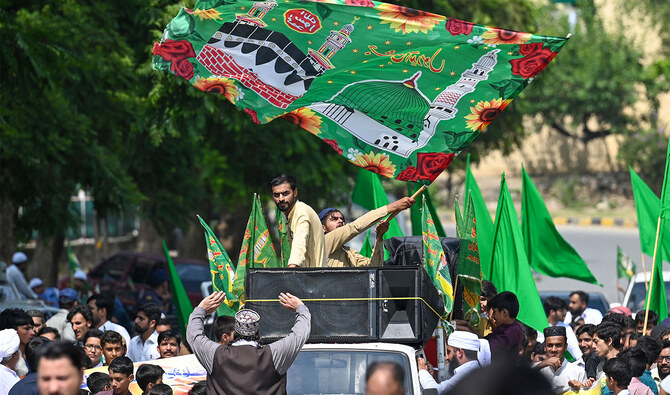ISLAMABAD: A National Seerat Conference organized by the Ministry of Religious Affairs and Interfaith Harmony was held today, Tuesday, in Islamabad on the occasion of Eid Milad-un-Nabi, Radio Pakistan reported, with top leaders urging reform in the Pakistani education sector based on the teachings of Islam and Prophet Muhammad (Peace Be Upon Him).
Eid Milad-un-Nabi is celebrated world over on the 12th of the Islamic month of Rabi Al-Awwal. In Pakistan, the day dawned with a 31-gun salute in the Pakistani federal capital of Islamabad and a 21-gun salute in all provincial capitals.
“Minister for Religious Affairs and Interfaith Harmony, Chaudhry Salik Hussain, on Tuesday emphasized the importance of following the teachings of the Holy Prophet Muhammad (Peace Be Upon Him) to enlighten the daily lives and strengthen the moral fabric of society,” Radio Pakistan said, reporting on the minister’s comments at the opening ceremony of the Seerat Conference.
“Minister Salik … noted that this year’s conference theme, “The Educational System of the State in Light of Seerat-un-Nabi (Peace Be Upon Him)”, highlights the Prophet’s exemplary leadership and governance, which transformed Madina into a welfare state based on education and wisdom.”
In his speech, Minister Salik emphasized the critical need for an education system inspired by Islamic values that not only “focuses on intellectual growth but also moral and spiritual development.”
He recalled the prophet’s first divine command, ‘Iqra’ (Read), underscoring the importance of knowledge as a foundation for human civilization and progress, adding that the inclusion of ethical teachings, such as honesty, justice, and responsibility, into the educational curriculum was “vital for fostering a balanced and well-rounded society.”
“Minister Salik said the key point that shook the very roots of feudalism, inequality, and injustice is the fundamental right to education for all of humanity, without discrimination,” Radio Pakistan said. “The Holy Prophet (Peace Be Upon Him) advocated for every person’s right to acquire knowledge, whether male or female, regardless of race or social status.”
The curriculum should be designed to balance religious and worldly knowledge, Salik said, and subjects like science, mathematics, and history should be taught alongside the Qur’an, Hadith, and Fiqh to ensure a well-rounded education for students.
“The role of technology in the education system cannot be overlooked … The principles taught by the Prophet (Peace Be Upon Him), such as utilizing all available resources to acquire and disseminate knowledge, are still applicable today,” Salik added. “Integrating technology into the education system can make knowledge more accessible and engaging.”
The Seerat-un-Nabi Conference is an annual event organized by the Ministry of Religious Affairs to encourage research and discussion on the various aspects of the life of the prophet and their application in modern times.
Earlier in the day, President Asif Ali Zardari and Prime Minister Shehbaz Sharif urged the nation and the Muslim Ummah to follow the teachings of the prophet as a “guiding light to overcome prevailing challenges.”
In his message, Zardari called on Pakistanis to use the life of the prophet as a “source of guidance” and spread his message of love and compassion for all mankind. In a separate message, the PM said the “blessed life, noble character, and exemplary conduct of Holy Prophet Muhammad (pbuh) serves as a beacon of light for entire humanity.”
Streets, roads, buildings, mosques, and houses around the country were decorated with colorful lights on Monday night and milad processions will be taken out in all cities today, Tuesday.
Mehfil-e-Milad are also being organized in all small and major cities to highlight the life and teachings of the last prophet.
















